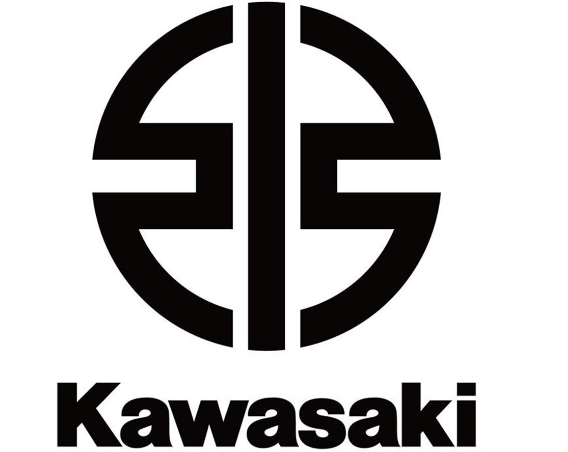2022 Kawasaki KLX140R L Drive Chain
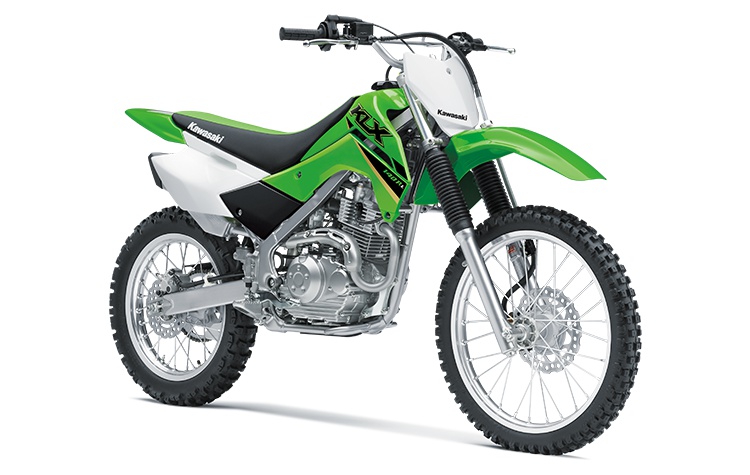
Drive Chain
For safety and to prevent excessive wear, the drive chain must be checked, adjusted, and lubricated before riding. If the chain becomes badly worn or maladjusted- either too loose or too tight- it could jump off the sprockets or break.
WARNING
A chain that breaks or jumps off the Sprock ets could snag on the engine sprocket or lock the rear wheel, severely damaging the motorcycle and causing it to go out of control. Inspect the chain for damage and proper adjustment before each ride.
Chain Slack Inspection
- Raise the rear wheel off the ground, then rotate the rear wheel to find the place where the chain is tightest (because it wears unevenly).
- Push up the drive chain in the middle of the upper chain run to measure the chain slack. The distance between the chain and the swingarm (at the end of the chain slipper) should be within the standard value.
Drive Chain Slack (KLX140A/B)
- Standard 35 41 mm (1.4 1.6 in.)
Drive Chain Slack (KLX140C)
- Standard 45 51 mm (1.8~2.0 in.)
- Adjust the drive chain if its slack is out of specification.
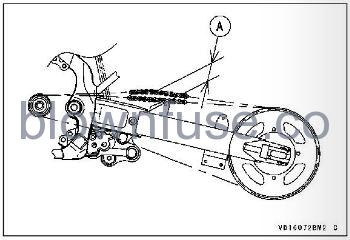
- A. Chain Slack
- In addition to checking the slack, rotate the rear wheel to inspect the drive chain for damaged rollers, loose pins, and links and the sprockets for unevenly or excessively worn and damaged teeth.
- If there are any such defects, replace the drive chain and/or the sprockets.
Chain Slack Adjustment
- Remove the cotter pin from the rear axle nut.
- Loosen the rear axle nut and both chain adjuster locknuts.
- Turn both chain adjusting bolts evenly until the drive chain slack (measured between the chain and the swingarm) is within the standard value.
- For the rear wheel to be properly aligned, the chain adjuster end of the left chain adjuster should align with the same swingarm mark that the chain adjuster end of the right chain adjuster aligns with.
Drive Chain Slack (KLX140A/B)
- L 35 41 mm (1.41.6 in.)
Drive Chain Slack (KLX140C)
- 45 51 mm (1.8 2.0 in.)
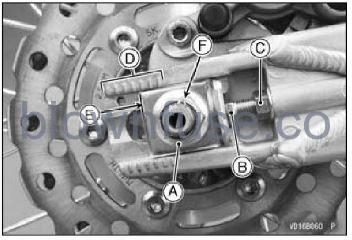
- A. Rear Axle Nut
- B. Adjusting Bolt
- C. Locknut
- D. Marks
- E. Chain Adjuster End
- F. Cotter Pin
NOTE
Wheel alignment can also be checked using the straightedge or string method.
WARNING
Misalignment of the wheel will result in abnormal wear and may result in an unsafe riding condition. Align the rear wheel using the marks on the swingarm or measure the distance between the center of the axle and the swingarm pivot.
- Tighten both chain adjuster locknuts.
- Torque the rear axle nut to the specified torque.
- Tightening Torque
- Rear Axle Nut
- 79 Nm (8.1 kgf m, 58 ft-lb)
- Rear Axle Nut
- Rotate the wheel, measure the chain slack again at the tightest position, and readjust it if necessary.
- Install a new cotter pin through the axle and spread its ends.
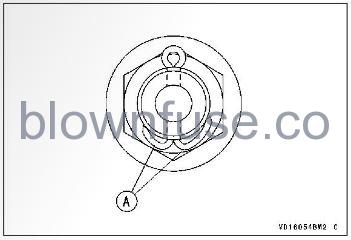
- A. Cotter Pin
- WARNING
A loose axle nut can lead to an accident resulting in serious injury or death. Tighten the axle nut to the proper torque and install a new cotter pin. - Check the rear brake effect.
Chain Wear Inspection
When the chain has reached its wear limit (i.e. when it has stretched by 1.7% of its original length),it is no longer safe for use and should be replaced.
Since it is impractical to measure the entire length of the chain, determine the degree of wear by measuring a 20-ink section of the chain.
- Tighten the chain either by using the chain adjusters or by hanging a 10 kg (22 Ib) weight on the chain.
- Measure the 20-ink section on a straight part of the chain from the center of the 1st pin to the center of the 21st pin. If the length exceeds the ser vice limit, the chain should be replaced. Since overworn sprockets will cause a new chain to wear faster, inspect both the engine and rear sprockets whenever the chain is replaced, and replace them if necessary.
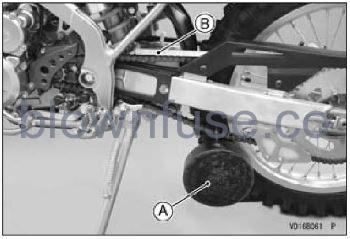
- A. Weight Weight
- B. Tape Measure

Chain Guide Wear Inspection
- Visually inspect the drive chain guide and replace it if excessively worn or damaged.
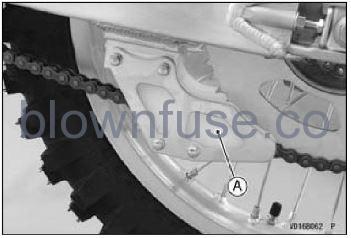
- A. Chain Guide
Chain Slipper Wear Inspection
- Visually inspect the chain slipper on the swingarm and replace them if worn or damaged.
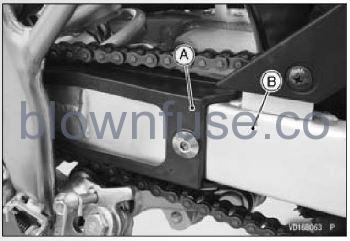
- A. Chain Slipper
- B. Swingarm
Sprocket Wear Inspection
Visually inspect the sprocket teeth and replace the sprocket if its teeth are worn or damaged.
Sprocket Tooth Wear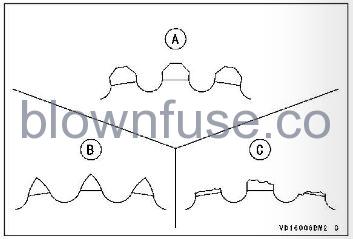
- A. Good Teeth
- B. Worn Teeth
- C. Damaged Teeth
NOTE
Sprocket wear is exaggerated in the illustration.
Chain Lubrication
- Lubrication is necessary after riding through rain or on wet roads, or any time that the chain appears dry.
- Use a chain lubricant for motorcycles. If the chain is especially dirty, clean it using a cleaner following the instructions supplied by the chain cleaner manufacturer.
- Apply lubricant to the sides of the rollers so that it will penetrate to the rollers and bushings. Wipe off any excess lubricant.
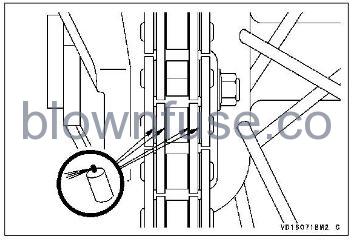
- Wipe off any lubricant that gets on the tire surface.

